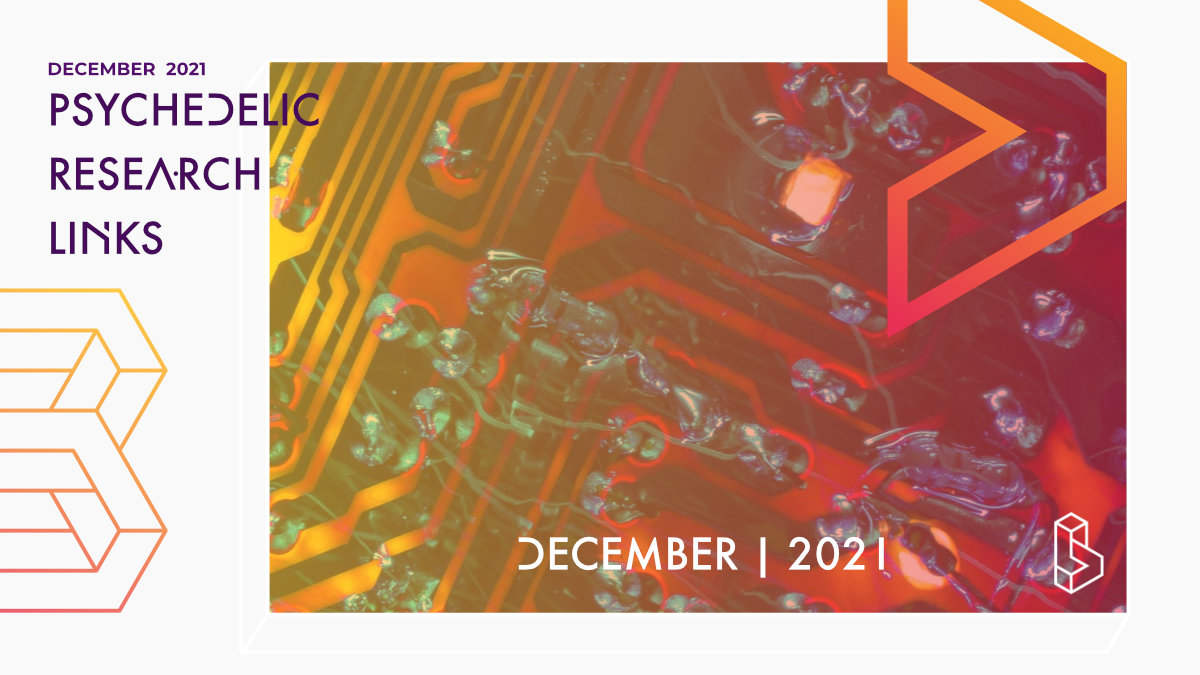This is all the other psychedelic research that comes out in December 2021. These papers don’t (yet) have their own page in our database.
This page will be updated (almost) every day.
You can find all interesting papers in our Papers Database.
Related Papers
Use CTRL/CMD+F to quickly search if anything relevant for you has been published this month.
- Response to Luz & Mash on cardiac toxicity of ibogaine (response to a critique of a study investigating the cardiac toxicity of ibogaine)
- Diversification of ergot alkaloids and heritable fungal symbionts in morning glories (the psychedelic effects of morning glories come from fungi, as do those on grains, “Our results are consistent with the defensive symbiosis hypothesis where bioactive ergot alkaloids from Periglandula symbionts protect seeds and seedlings from natural enemies, and provide a framework for exploring microbial chemistry in other plant-microbe interactions.“)
- Microdosing of Psychoactive Substances in Business Practice (very negatively framed review of microdosing, naming ‘abuse’ 3x in the abstract, and from the discussion “The description of different psychoactive substances used for microdosing shows the above various effects of such abusive drugs“)
- The Use of Hallucinogens in the Treatment of Mental Health Disorders (thesis)
- Editorial: Beyond the Pharmacology of Psychoactive Plant Medicines and Drugs: Pros and Cons of the Role of Rituals and Set and Setting (editorial, Frontiers in Pharmacology)
- Safety, clinical and neurophysiological effects of intranasal ketamine in ECT non-responders: an open-label clinical trial. Pilot Study. Research Protocol (research protocol for a forthcoming open-label trial)
- 1H Nuclear Magnetic Resonance: A Future Approach to the Metabolic Profiling of Psychedelics in Human Biofluids? (theory-building, a novel analytical chemistry approach for measuring the breakdown of psychedelics)
- Sex Differences in the Behavioral, Molecular, and Structural Effects of Ketamine Treatment in Depression (review, sex differences during ketamine treatment)
- Ketamine Action on Astrocytes Provides New Insights into Rapid Antidepressant Mechanisms (book chapter)
- ACNP 60th Annual Meeting: Poster Abstracts P276 – P550 (list of abstracts from soon-to-be-published papers presented at the recent 60th ACNP conference)
- MDMA (academic book chapter by Mithoefers)
- A single LSD injection has a negligible effect on sucrose binge drinking in mice (in mice, no effect of 0.1mg/kg reduced sugar-drink consumption but returned to baseline a week later)
- In vitro pharmacological characterization of novel psychoactive substances and in vivo analysis of psilocin for clinical applications (thesis)
- 1H Nuclear Magnetic Resonance: A Future Approach to the Metabolic Profiling of Psychedelics in Human Biofluids? (analytical chemistry, a novel approach for profiling psychedelics in human biofluids)
- Psilocybin-assisted psychotherapy for depression: Emerging research on a psychedelic compound with a rich history (review, psilocybin therapy for depression)
- Psilocybin and Depression: Past Psilocybin Use Improving Future Depressive Symptom Management (thesis, n=370 survey, some (weak) relationships between psilocybin use and (lower) depression scores)
- Drug Treatment of Cluster Headache (various other drugs, mentions ketamine and LSD as potential treatments)
- Psychedelic Science of Spirituality and Religion: An Attachment-Informed Agenda Proposal (research direction proposal)
- An age-period-cohort analysis of trends in psychedelic and ecstasy use in the Australian population (Australia, use increased between 2001-2019, MDMA peaked at 2007)
- Teacher plants — Indigenous Peruvian-Amazonian dietary practices as a method for using psychoactives (n=16, interview study, diet of Peruvian traditional healers)
- Predictors of Psychedelic Experience: A Thematic Analysis (preprint)
- The Hallucinogenic Serotonin2A Receptor Agonist, 2,5-Dimethoxy-4-Iodoamphetamine, Promotes cAMP Response Element Binding Protein-Dependent Gene Expression of Specific Plasticity-Associated Genes in the Rodent Neocortex (in rats, “Collectively, these results indicate that the hallucinogenic 5-HT2A receptor agonist DOI leads to a rapid transcriptional upregulation of several neuronal plasticity-associated genes, with a subset of them exhibiting a CREB-dependent regulation“)
- In silico studies on psilocybin drug derivatives against SARS-CoV-2 and cytokine storm of human interleukin-6 receptor (potential of psilocin and other compounds from ‘magic mushrooms’ may play a role in inhibiting negative effects of SARS-CoV-2, i.e. they may help reduce negative effects, not prevent or ‘cure’)
- Ketamine vs midazolam: Mood improvement reduces suicidal ideation in depression (secondary analysis, shows known positive effects on mood and lower SI)
- The Potential of Psychedelics for End of Life and Palliative Care (academic book chapter, review of end-of-life psychological influences of psychedelics, mainly psilocybin)
- CYP 450 enzymes influence (R,S)-ketamine brain delivery and its antidepressant activity (review)
- Antidepressant-like actions of the mGlu2/3 receptor antagonist TP0178894 in the chronic social defeat stress model: Comparison with escitalopram (in mice!, ketamine-like glutamate receptor agonists shows promise)
- Mechanisms of Ketamine and its Metabolites as Antidepressants (review, argues that targetting anti-depressant pathways directly may lead to medicines that have fewer side effects than ketamine)
- Long-term increase in sensitivity to ketamine’s behavioral effects in mice exposed to mild blast induced traumatic brain injury (in mice, “The results suggest that ketamine may be effective for treating neuropsychiatric complications that emerge after TBI but urge caution when used in clinical practice for enhanced sensitivity to its side effects in this patient population.“)
- Sex-dependent metabolism of ketamine and (2R,6R)-hydroxynorketamine in mice and humans (finds slightly (1.2/1.3x) higher levels of ketamine (metabolites) in men vs women, both in humans and mice)
- Electrophysiological correlates and predictors of the antidepressant response to repeated ketamine infusions in treatment-resistant depression (n=24, RCT, “Both medications decreased alpha and theta immediately post-infusion, however, only midazolam increased delta (post-infusion), and only ketamine increased gamma (immediately post- and 2 h post-infusion).“)
- Efficacy and safety of repeated esketamine intravenous infusion in the treatment of treatment-resistant depression: A case series (n=1, long-term administration of esketamine (12x), prolonged antidepressant effects for up to 6 months)
Become a psychedelic insider
Get a Pro Membership to enjoy these benefits & support Blossom📈 full reports on Topics & Compounds
🧵 full summary reviews of research papers
🚀 full access to new articles
See Memberships

